#it just bothers me so so much how straight women act towards queer relationships sometimes
Explore tagged Tumblr posts
Text
my hot take for the day is that I trust the average straight man more than straight women who romance astarion with their twink elf male tav who’s been modded to the extreme
#and ascend him every playthrough and don’t see the problem with astarion ascending#it just bothers me so so much how straight women act towards queer relationships sometimes#and this definitely isn’t to say that straight women can’t make twink tavs and romance men#there’s nothing wrong with that#not inherently#but it gives me the genuine ick when i see their Dark and Mysterious twink elf male tavs with astarion and then they ASCEND ASTARION#it gives me the same uncomfortable feeling as the boyfriends webtoon comic#like these things are not related but the genuine ick is the same#im aware im a hater this is me being a hater im straight up admitting that#but as a more feminine gay man it makes me so genuinely uncomfortable to see shit like this because it FEELS like queer relationships are#being fetishized#and thats my hot take for the day#🕺🕺🕺🕺🕺🕺🕺🕺🕺#jes rants
19 notes
·
View notes
Text
Queerphobic
When somebody is attracted to you, and they have steadfast belief they should not be; they project that onto you.
Today, some dude hit on me in the most blunt fashion I've ever seen; and then... It hit me--all the times I've been in this situation before.
Today I run with an older crowd, have 808s, and have gone through the feminine puberty.
Ain't nobody got time to act like they used to, or to be as fearful of relationships or expressing feelings like they used to be.
So they're more blunt.
And I can't help but remember the nervousness *other* people had around me; Queerphobia.
We throw that word around sometimes, yet it means something very specific. Fear of Attraction to the wrong person, or fear that the *wrong person* might be attracted to us.
It's as ingrained in our culture as abstinence, thanks to Religious Fanaticism. The kind of Fanaticism that supercedes and prevents the need for faith.
Because nobody told me how others saw me, or because they assumed I knew that I was attractive to straight men... It was hard to quantify any interaction at all with certain people.
I knew I was frequently uncomfortable around certain people; I could not quantify why that was.
And the women who knew better; well; I dunno what to say about that. Except to lump them all in that same queer-phobic group.
Everybody I knew just assumed I'd figure it out myself.
I have this assumption that women typically talk to each other about the "Male gaze" upon them, and that their "The Talk" about the [Birds and Bees] contains some arbitrary hints on how the world sees women.
Then again; how would I know?
It was much easier to hide away and hermit. Because I didn't know how to operate in an environment where people could harbor hate for me *because* they were attracted to me.
This peculiar way that I appear to others. I can see it in their faces; but it's a very... Odd mass of feelings. Hate, Anger, Shame, Attraction, all rolled up into something very very scary.
To Men; and I suppose this is true for all women; They used to get upset *at me*; for relatively no reason. As if they were silently blaming me for being just so Fap-worthy.
To Women; And this is probably true for most straight women; I either look like a Dyke, or because I appear so feminine; they can assume I'm gay.
Especially when I enforce my boundaries against Randos that I just don't know.
That internalized Queerphobia. I know that people often have negative reactions around me, especially when it comes to attraction, and how do you deal with that?
That's the anxiety I used to have around relationships I think.
That feeling when enough people harbor animosity towards you for no other reason except you're *pretty*.
And, from that perspective, you can't really tell who is safe and just uncomfortable. And who isn't safe, and will take it out on you after whatever triggers them does so.
The world is definitely a safer place today I think.
Safer to express yourself at least. For now.
Today, unless I tell them, some people can't seem to figure out if I'm a woman or a trans man; and whether or not either of those bothers them.
I'm really trying hard to express these emotions, and the situations I've been in, because it's valuable information for [The Queers]--Women especially.
And for parents who can see something happening but may not know how to beat protect their children in these situations.
Even if you don't approve of the "Queer Lifestyle" Which is just a straight lifestyle with extra steps...
As a parent or a grand parent, or some guardian for some child or children; it still behooves you to have the talk with them.
If only to ensure they don't become unwitting victims to predators, or worse; Haters.
Well
I hate how my anxiety has changed; but at least it feels more inline with some tangible concept now. At least it feels more familiar to what other people have said or written about their own experiences.
And now I fully understand why Women tended to hate me for seemingly no reason. They were jealous; and that jealousy tends to be expressed as hate and accusations of things I wouldn't do.
So.. I guess that's just the "Female Experience" with extra steps.
Why does everything have to be something else with extra steps?
0 notes
Note
hm would you write a fic about annie coming out to jeff? i love their friendship and brother/sister relationship :)
thank you so much for this request! i honestly got a bit emotional writing this. annie coming out to jeff is something that can honestly be so personal...
there's some focus on annie coming out to other members of the study group, but it does mainly focus on her and jeff. i hope that's okay :)
Annie had decided to come out to her friends in the same way she tended to do most things: efficiently and beginning by making a list.
Well, she supposed the most efficient way would be to come out to all of them at the same time, but this way would be more effective in the long run. She knew they’d all have very different reactions, different questions to ask, different levels of surprise, so if they all found out at once, most likely no one’s questions would get answered (not just the ones she would politely ignore), the group would start talking over each other, someone would yell at Pierce and it would almost be forgotten what the point of the conversation even was. This way, although it would take longer, everyone would hopefully be satisfied.
She told Troy and Abed first. That was the easiest, as because the two were a couple, she had no doubt they’d be accepting. Additionally, in the time they’d lived together, she had a feeling they’d already picked up on some of her not-so-straight behaviours: the girl-crushes she formed on the pretty women in the movies they watched together and her disinterest or non-romantic affection towards the men she knew she was ‘supposed’ to swoon over; the way she giggled and twirled her hair while on the phone with a certain girl from Greendale she’d recently reconnected with; the one time she didn’t delete her search history from the apartment computer and Abed may or may not have seen her recent searches, which included among others, ‘am I gay test,’ ‘comphet meaning’ and ‘can you be straight but think girls are really pretty and rarely have long lasting feelings for men?’
She’d come out to them over breakfast one day, and they basically had the best response she could have wished for. They were totally cool with it, but didn’t make it a big deal. They joked about how she was no longer the token straight roommate, she hugged both of them, and the day went on as normal.
Annie had crossed their names off her list with a big smile on her face.
Next had been Britta. Annie had also guessed that she’d be accepting, as what had happened with Paige last year had been a bit misguided but well-intentioned. At least Annie didn’t have to worry about Britta only wanting to be her friend because she was a lesbian, because they were already friends, and Annie suspected Britta had learned her lesson.
As expected, Britta reacted well. Perhaps too well, loudly proclaiming her supporting for the LGBTQ community before asking a string of questions about what it was like dating girls and if kissing them was different if you were sobre and/or not doing it to prove you weren’t homophobic. Annie explained she didn’t know - she actually hadn’t kissed a girl yet - but did wonder if Britta’s questions weren’t just due to her being an ally. She could be wrong, but she had read something about queer people having a way of spotting each other. Still, it wasn’t her place to assume anything, and she put the thought out of her mind as she crossed off Britta’s name.
Next was Jeff. This was a bit trickier. Once again, she didn’t think Jeff would be at all homophobic (unless he turned out to be one of those men who only viewed relationships between women as hot, but she’d cross that bridge if she came to it), but coming out to him made her nervous for another reason. Ever since they’d kissed at the Transfer Dance, his feelings for her had seemed unclear. At first, he’d seemed determined to forget it ever happened - which she’d found unfair at the time, but now appreciated - but lately, it was possible he had actually become interested in her. It felt… really weird, when she thought about it for too long. Not only was she definitely not interested in him, but, partially due to their age gap, their relationship felt too close to a father-daughter or older brother-younger sister relationship to be romantic. Sometimes she wondered why she’d ever liked him like that at all.
Although, since she’d extensively researched what comphet was and realised that was undoubtedly what she’d been experiencing, she could understand a bit better she’d never really liked him to begin with, she’d just latched onto a seemingly unattainable man to convince herself she could be attracted to guys, yet again.
As everyone packed up their stuff to leave the study room, Annie remained seated. “Um, Jeff,” she said. “We’ve both got a free period now, right?”
“Right,” Jeff replied, not looking up from his phone.
“Would you mind if I talked to you about something?”
He looked at her curiously. “Yeah, sure.”
Troy, Abed and Britta had clearly all realised what was going on. Abed gave her a small, supportive smile, Troy gave a quick thumbs up, and Britta winked in a way Annie guessed was meant to be subtle, but no doubt everyone in the room saw.
“Come on, guys,” she said, ushering the others out of the room. “This sounds important, and private, and we’ve all got classes to get to.”
Shirley stopped, muttering that she’d forgotten a textbook, but Britta practically pushed her out of the door as Abed said in a deep voice, seeming to have taken the opportunity to act like a security guard, “Keep it moving.”
Annie smiled as she watched them leave, her friends dramatics a pleasant distraction from what she was about to do. She turned back to Jeff to see he’d put his phone down. Clearly, he knew this was serious. “So,” he said. “What did you want to talk to me about?”
Annie opened her mouth, let out a squeak, then closed it. This was going to be difficult. Maybe she should have just come out to everyone at the same time, the consequences be damned. That way, she would have got it all over with at once.
“Annie, is everything okay?” Jeff sounded so genuine in his concern, a relatively rare sight. “You know you can tell me if something’s bothering you?”
“No, everything’s fine,” she assured him, finding her voice, but he didn’t look convinced. She took a deep breath. “I was thinking recently about that time we kissed.” He looked confused for a second. Didn’t he remember that night? Not that she cared, of course. “You know? During the dance at the end of our first year? I had just decided not to move to Delaware with Vaughn-”
“Right, right,” he cut her off. “I remember. Sorry, go ahead.”
“Thank you,” she said curtly. “So, I’ve been thinking about our kiss, and-”
Once more, he interrupted her. This was just getting annoying. “Annie, look, I know I’ve been giving… pretty mixed signals about my feelings for you, or if I even have any, but lately I’ve taken a good look at myself, and realised that it would never really feel right to be with you. For many reasons, none of which are your fault. It’s just that you’re much younger than me, and you often feel like a little sister to me - as well as a friend, of course - so I’m sorry, but-”
“Jeff.” Her firm tone silenced him.
There, she thought. How does it feel to be interrupted?
“I don’t want to be with you either!”
“Really?” he checked. “Because it wouldn’t be your fault if you did, I’m the one who needs to keep whatever feelings I have for you in check. Plus, I mean, I wouldn’t blame you…”
She rolled her eyes, but a smile began creeping onto her face. “I swear. I was going to say that I’ve been thinking about that kiss because of how, back then, I thought I really liked you. In a romantic way, I mean. But recently, I’ve realised that I just made myself think I liked you, even loved you. I wanted to convince myself I could be attracted to men, so just like with Troy in high school, I picked an unattainable - or so I thought - man. In his case: someone cool and popular who I thought would never notice ‘little Annie Aderal.’ With you, a cool, older guy who just saw me as a child.”
“Annie.” Jeff’s tone was serious but not annoyed. “Are you saying what I think you are?”
She nodded, her lips a thin line. “I’m a lesbian, Jeff. I really hope this doesn’t change things between us, although, honestly, knowing you don’t want to be with me is a big relief, because I was worried I’d break your heart or make things weird, but…” She paused. She was getting ahead of herself. “Well, have I made things weird?”
“Of course you haven’t! Thank you for telling me, that was really brave, especially if you thought I was still interested in you.”
“Thanks,” she said. She quickly added, “It’s not that I thought you’d react really badly. I don’t see you as someone who thinks he’s somehow entitled to any women he has feelings for, but still… I didn’t want to hurt you.”
He stood up, walking around to her side of the table, presumably to remove the physical and metaphorical distance between them, and gesturing for her to stand up as well, which she did. “You haven’t hurt me at all, Annie, I promise. I care about you, so much, even - no, especially - as a friend, and I just want you to be happy. Even if I was madly in love with you - which, thankfully, I’m not - I could never be upset at you, or anyone, for this.”
Annie could feel tears forming in her eyes. “Aww, Jeff!” She practically threw herself at him, wrapping him in a tight hug which he happily returned, laughing.
“Okay, we don’t have to make this all dramatic,” he said, but Annie was sure he sounded a bit choked up.
They came apart, smiling at each other for a few seconds before Jeff hesitantly reached out and gave her a pat on the head. “For old time’s sake,” he explained.
Annie had never felt happier while being given a head pat, which didn’t say much, she knew, but it was accurate, as she’d probably felt happier in general at some point in her life. Still, this was definitely in her top ten.
That night, she crossed off Jeff’s name, remembering the days she would doodle hearts as she wrote down his name, or paired her first and his last. This time, she instead drew a little smiley face. That was far more accurate, she thought. The thought of Jeff no longer made her heart flutter in her chest, but he made her smile, and she was more than happy with that.
#community#nbc community#annie edison#jeff winger#troy barnes#abed nadir#britta perry#shirley bennett#pierce hawthorne#lesbiannie#trobed#community fanfic#my writing#ask#lesbiannie-rights
78 notes
·
View notes
Text
Okay, so I like queer!Johnny and l@wrusso just as much as anyone, but lately I’ve been having some thoughts about the way media and fandom frames violence in men as an indicator of potential queerness. Particulary on the way this can sometimes change how people interpret classic macho behavior, such as misogyny or agressiveness.
Despite the stereotypes that exist about gay men being more feminine, there’s also this narrative in our culture that men who are aggressively masculine, especially if is in a way that’s harmful to others or themselves, are probably acting out because of repressed homosexuality or queerness. This is easy to observe in media: there’s the trope “Armoured closet man”, and Rantasmo mentions some examples in his video “The homophobic hypocrite”. And like he explains, this is something people sometimes apply to real life situations. For example, I have a friend who is usually pretty chill about engaging in gay behavior with other dudes for the laughs, and one day he was discussing it with a friend and they were like “Yeah, we don’t care. Some people care too much about appearing gay and we know why”. This idea it’s not limited to men: you can also find it in Lily Singh’s video “A Therapy Session For Homophobic People” where the homophobic lady ends up asking her out. Those are the first example’s I could remember, but there are more.
I’m not saying it’s not something that happens. Obviously, being homophobic or being conservative about gender roles does not guarantee that someone’s straight or cis. We were all raised in a homophobic, heteronormative society, after all. I was, at some point, scared of being gay. And I understand where the specific connection comes from: sometimes when you’re guilty or ashamed of something, you lash out more easily. That’s why there’s such a complex relationship between repression in queer men and violence: if you can’t express your desires in a healthy way, that can lead to channeling those feelings into aggression, which is more “socially acceptable”.
So it’s not automatically wrong to make the connection. What’s been bothering me lately is how interpreting homophobic, misogynistic, or just generally violent behaviors as secondary effects of repressed queer desire sometimes suggest that homophobia or misogyny are not enough on their own. Just like my friends said that one time: if you’re a man and you’re homophobic, it has to be for a reason. And that reason is not that you live in an homophobic, misogynistic society that makes you hate queer or feminine people, it has to be something particular about you that makes you more susceptible to those ideas.
The thing is that this is pretty convenient for cishet, conventionally masculine, men. It ends up suggesting is that homophobia, misogyny, aggression or other harmful attitudes have actually nothing to do with hegemonic masculinity. It’s only when men don’t fit into this ideal that these toxic behaviors start leaking out. And it’s not just convenient for them as individiduals, it also absolves our culture; if it’s the result of a particular experience, we don’t need to start thinking too hard about how our gender roles affects us in general.
Which reminds me of a video I saw recently, by Lindsay Ellis. She’s discussing transphobia in film, but there’s this moment when she’s talking about the movie Psycho, and she mentions Ed Gein, the real life version of Norman Bates. Apparently, he was originally presented in the media as a man who had unresolved queer tendencies, which served as an inspiration for the character in the film. But. That was a lie. There was no evidence that this was actually true for Ed Gein. As far as everyone knows, he was a straight cisgender man who killed women. And she brings up this quote, from Richard Titthecott, “Of men and monsters”:
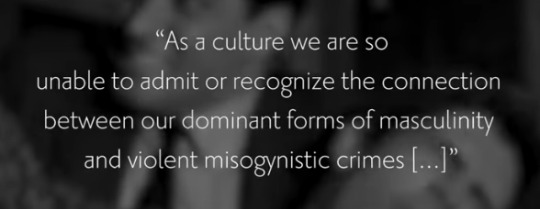

So, the video is specifically about the perceived relationship between serial killers, trans women, and how this relates to transphobia. And I was talkig about seeing agressively masculine men, so I know it’s not exactly the same thing. But I keep thinking about that and about what Rantasmo said on his video. He goes from talking about canonical homophobic queer characters to talking about real life situations. And he mentions how sometimes when a homophobic hate crime takes place, people start speculating about whether or not the killer in question is queer himself, often implying that maybe it wasn’t really an explression of homophobia, but an example of the self-destructive tendencies of gay people. What he concludes is that this idea of the “homophobic hypocrite” is often used to “push the responsibility of homophobia and hate crimes off of heterosexuals and on to the victims”.
While these examples have to do with particularly strong forms of misogyny and homophobia, it’s not out of the question to consider how this relates minor forms of violence.
All of this is just about Thoughts. I’m not going to reach any conclusion here, because it’s impossible. Especially when it comes to what is and isn’t a Good or a Bad headcanon or ship. Like I said at the beginning, those ships can be fun and can be interesting for many reasons. I just want to think about the things that may be influencing my interpretations of a story without my knowledge. If we start to believe that just living in a world where you know that being a straight man gives you certain privileges over women and queer ppl is not enough to be hateful towards them, it becomes harder to hold privileged people accountable. Or to explore how those privileges work and why they are put in place. Obviously, there are many ways to talk about this topic, and people can be more than one thing. A man can be queer and misogynistic for example, both privileged and opressed. I don’t know.
Basically, I’m just going to end this post by saying that the idea that “queer interpretations of mainstream media are a way to expand the narrative and include ourselves in the stories we love, and these interpretations are often mocked or rejected by mainstream writers and audiences that think that labelling something as gay is insulting, so they often go against the current” can coexist with the idea that “interpreting homophobia, misogyny, aggression or other harmful attitudes as indicators of potential queerness can be pretty convenient for straight cis conventionally masculine men, and also the association between queer men and violence and self-destructive tendencies is really prevalent in mainstream media and in our homophobic culture”. ???
??????????????????????????????????????????????????????????????????????????
#cobra kai#queer stuff#karate kid#johnny lawrence#oh and as usual: my native language is not english. please let my know if something sounds weird#i don't know how to feel about this#that's the only conclusion i have#i guess i just keep comparing this to everything i feel about daniel and mr miyagi and all those movies that portray a more tender version#of masculinity and how they relate to queerness#and i've been feeling a lot closer to that lately#i still haven't recovered#at the same time i still#like those interpretations that are like#this man is clearly obsessed with appearing masculine so we don't know who he truly is#and also jeff winger is gay. i'm almost 100%.#also repression is a relatable experience as a fellow queer#but i just#i don't want to absolve misogynistic homophobic men is the thing
16 notes
·
View notes
Text
nobody asked but i think hanso, brynn, and xandra from neopets’ comic “the faeries’ ruin” are queer | a 1.8k presentation i am presenting to my friends at an online party on the 19th, but you guys get early access because for some godforsaken reason, you like this content from me
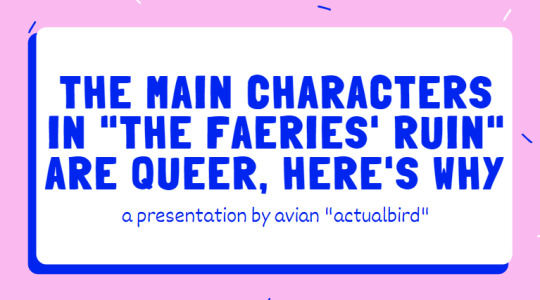
Good evening class.
Last last time I attacked your dashboards with a long post, I discussed Neopets that would benefit from therapy. I’m sticking with my Neopets shtick but in a funkier Pride flavor. In this post, I will be discussing why the three main characters of Neopets’ “The Faeries Ruin” are queer.
So what is “The Faeries Ruin?”
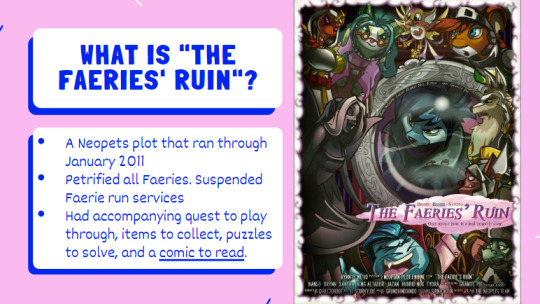
“The Faeries Ruin” was a Neopets plot that ran through January of 2011. Plots can affect the website's appearance, services, and gameplay, and this plot was most notable because it turned all the Faeries of Neopia to stone.
Quick crash course on Neopets lore, for those of you who don’t know anything about it: Neopets are the main population of the planet of Neopia, but they share the world with other creatures as well. One of these creatures are Faeries, magical beings who can be benevolent or malevolent. Majority of them are good, and can be visited to receive gifts, abilities, new appearances, better stats, etc. Faeries are the most powerful creatures on Neopia. With the Faeries of Neopia turned to stone, all Faerie run services, from games to shops, were suspended because. Well. It’s hard to run a business when you’re stone.
“The Faeries Ruin” had an accompanying quest to play through, items to collect, puzzles to solve, and most important to our discussion, is the accompanying comic to read.
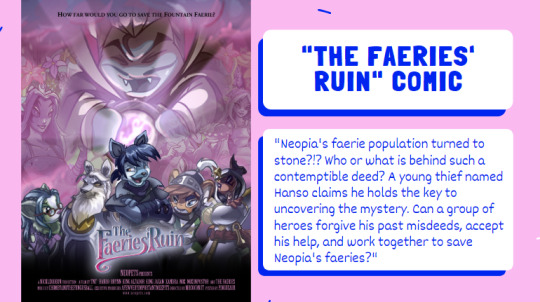
“The Faeries Ruin” comic is 17 chapters plus an epilogue. You can read the synopsis on the slide, and the story follows Hanso, a thief, Brynn, a guard, and Xandra, a scholar, who are all investigating the curse put on the Faeries.
A lot happens in the comic. Really, a LOT, so I don’t have time to summarize it for you. If you’re curious, you can read the plot here, and I’ll explain plot stuff as it becomes relevant to our discussion, but what’s really important are the characters.
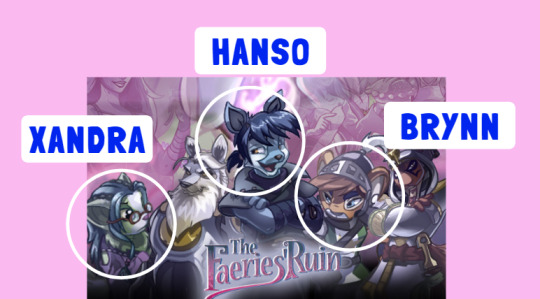
These three in particular, Hanso, Brynn, and Xandra, are who I will be focusing on from the queer perspective.
But because I aim to be inclusive, before we dive into calling Neopets characters queer, we need a quick crash course in ‘queer’ definitions.
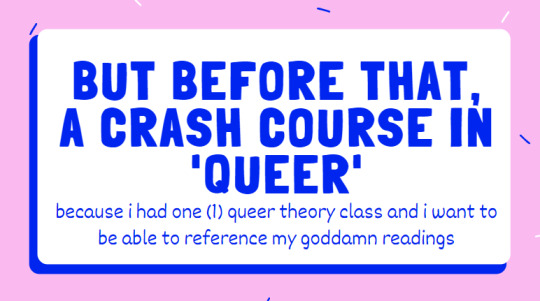
This is just so that we’re all on the same page. (Also so that I can use the readings I got from the queer theory class I was in last semester.)
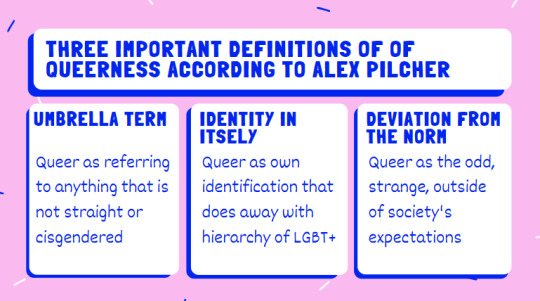
Alex Pilcher in the Introduction of “A Queer Little History of Art” gives the word “queer” three definitions. First is the simplest, the word “queer” can act as an umbrella term for anybody who is not straight or cisgendered. The second definition is “queer” as an identity in itself. Instead or in addition to using sexuality or gender labels, one can opt to identify as queer and that does away with any hierarchies or too small definitions that may bother other people. I, for example, am bisexual, asexual, and nonbinary. However, that’s kind of a mouthful, and sometimes I don’t want to explain every facet of my identity. So sometimes I just tell people I’m queer, and fuck them if that’s confusing, it feels good for me. The third definition of “queer” is what I will be referring to quite a lot of times in this discussion, “queer” as a deviation from the norm. This is a callback to the word’s more archaic use, meaning odd or strange. What is “queer” then is what goes beyond or resists against society’s expectations.
Queer Theory is a huuuuuuuge academic genre, and this is just the tip of the iceberg. But we’re on a schedule here, so let’s queer some goddamn Neopets.
First, we have Hanso.
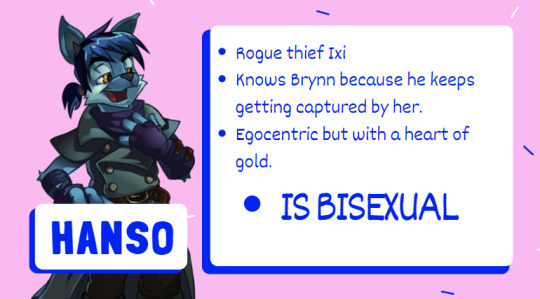
His Neopets species is an Ixi and he is a young rogue/thief. He knows Brynn because he’s a very shitty thief and he constantly gets captured by her. His personality is self centered and egocentric, but deep down, he has a heart of gold, even if his morals are a little skewed.
Also I think he’s bisexual. Why?
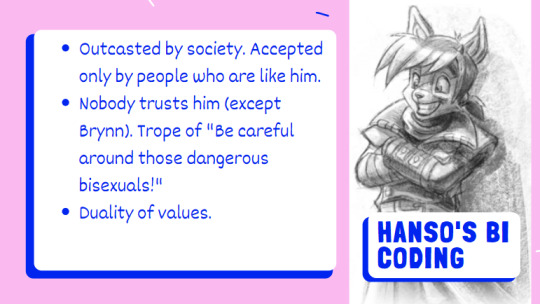
As a rogue/thief, he is outcasted by society, a type of queering from the norm. He is only accepted by those like him, which symbolically is parallel to how queer people often find other queer people to be with. Aside from Brynn, nobody trusts him. They think him to be a liar and a cheat, and this, I think, is parallel to the unsavory trope of the “untrustworthy bisexual.” Much the same way bisexuals are often told to “pick a side”, Hanso has both a desire for good and a desire for mischief, a duality that confuses other Neopets, and makes them wary of him.
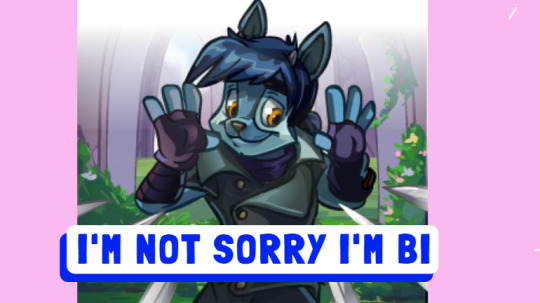
Hanso is bisexual. And he isn’t sorry about it.
Next up we have one of my early childhood crushes. Brynn.
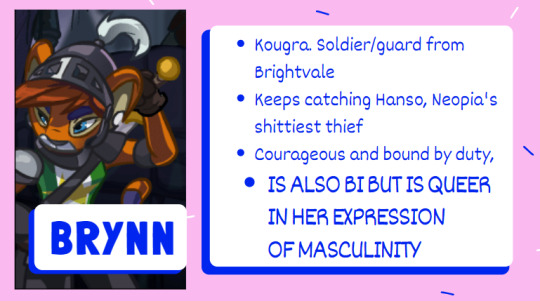
Brynn is a Kougra, a feline like Neopets species. She is a guard/soldier from the land of Brightvale. She knows Hanso because she keeps catching him, he’s a terrible thief. Her personality is one dominated by courage and a duty to Neopia’s safety.
And I think she’s also bisexual, but more interesting to me her queer expression of masculinity.
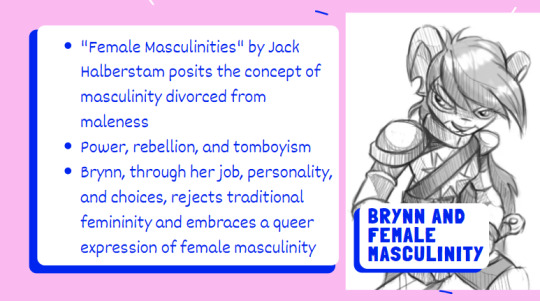
Jack Halberstam, a transgender man, wrote a book called “Female Masculinities” prior to his transition (I mention this because I know a lot of you may be wondering why a man gets any say about women’s issues, but I think this is a special case and that his views are still valid.) Halberstam, in his book, posits the concept of masculinity divorced from maleness. What this means, in simplest terms, is that masculinity is not something inherently male, just predominantly male. A female masculinity is thus outside of the norm, and a unique and queer expression of gender.
Concepts related to masculinity are things like power and rebellion. Strength, force, will, that kind of stuff. When we remove these things from maleness and allow femaleness to have these concepts, one of the results is tomboyism. The phenomenon of tomboyism is when a girl, usually young, exhibits masculine qualities. The thing about tomboyism is that it is reluctantly permitted during childhood but less expected as one grows older, the assumption being that a woman will submit to the societal expectations of what a woman is “supposed to be.”
I cannot find any canon sources to say that sexism is a huge problem in Neopia, but gender roles are still present. While we don’t see Brynn’s childhood in “The Faeries Ruin”, it doesn’t take much to imagine that her peers would be surprised with her choice to join the Brightvale Guard, a traditionally male pursuit. And yet she does it. She works hard and becomes such a good soldier that she aids King Altador himself during the story, that King Altador trusts and respects her opinions. Brynn rebels against society’s standards and asserts her own power.
Her personality exudes masculinity as well. Throughout “The Faeries Ruin” she is often dominant over the course of investigation, taking initiative, sometimes omitting truths for the greater good, and generally holding her judgement in high regard.
Her choices, especially in regards to her relationship with Hanso, is also something of note. Brynn is the one doing the catching and Hanso is the one being caught, an interesting subversion of expected gender roles. I will admit now that I have been withholding some information. Hanso, later in the plot of “The Faeries Ruin”, admits that he wanted to get caught by her as often as possible so that he would have an excuse to see her. Brynn did not know this, but I see it as a Hanso recognizing Brynn’s power and masculinity. I see it as a very romantic submission of Hanso to Brynn.
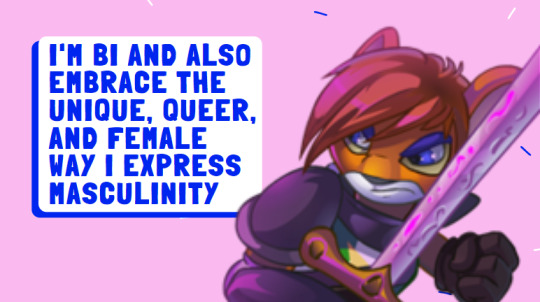
So Brynn is bi, because I say so. And she expresses masculinity in a unique, queer, and female way.
Now, before we move onto the last character, Xandra, I need to talk to you guys about Brynn and Hanso’s relationship. I think it is very good, it was one of my first OTPs, and here’s three reasons why it’s a good ship.
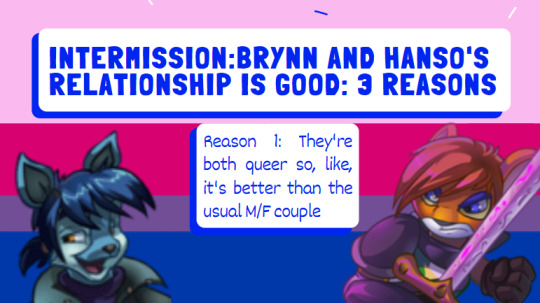
Reason 1: They’re both queer, so like, it’s better than the usual M/F couple. Bi people have more genders they’re attracted to, so the person they do end up choosing had to be better than literally everybody else. We can rest assured both of them are good eggs that are compatible with each other.
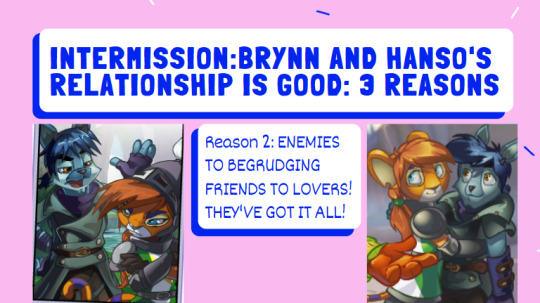
Reason 2: Their relationship over the course of “The Faeries Ruin” is that of the “enemies to friends to lovers” trope. Which, HELLO? GOOD SHIT? SIGN ME THE FUCK UP? THE HOSTILITY SLOWLY GIVING WAY TO RESPECT? THE RESPECT TURNING INTO ADMIRATION? Your honor, it’s delicious.
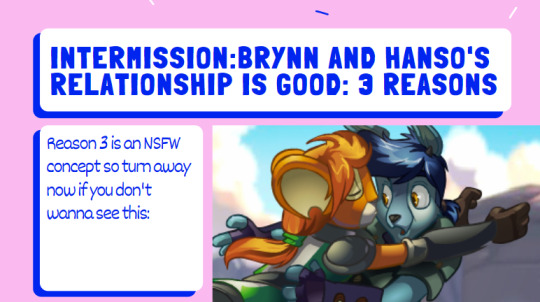
Reason 3: This reason is an NSFW concept, so if you don’t wanna see that, just Ctrl+F to the phrase “This brings us to our last character, Xandra” to skip it. We good? Everybody continuing to read wants to see this? Okay.
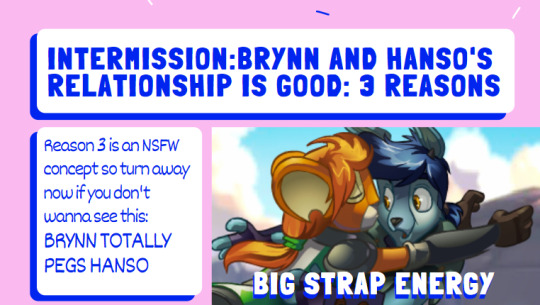
BRYNN TOTALLY PEGS HANSO. Like, I don’t have any sources, but by this point in the presentation, I hope I’ve established myself as an expert authority, and I hope you just believe me. She has the sword, in this relationship. Both literally and metaphorically. She pegs him and her strap is huge.
This brings us to our last character, Xandra.
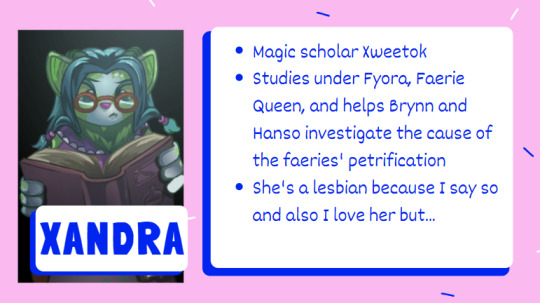
Xandra is a Xweetok and also a magic scholar. She studied under Fyora, the Faerie Queen, and helps Hanso and Brynn with their investigation of the faeries’ petrification. She’s a lesbian because I say so, but uhhhhhh…
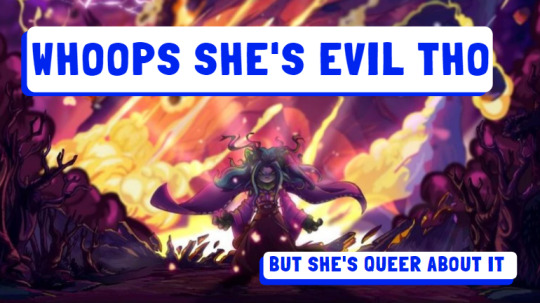
She’s also evil. Towards the end of “The Faeries’ Ruin” it was revealed that Xandra was the one who petrified the faeries all along. So yeah, she’s evil, buuuuuuut she’s super queer about it. How? Well, the answer lies in her motives.
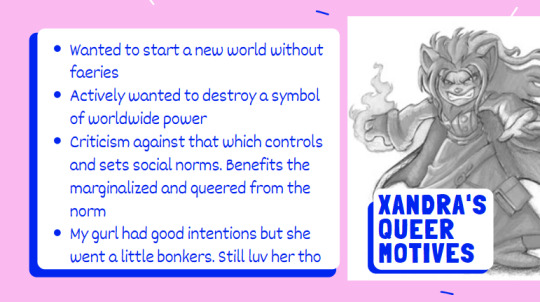
The reason why she petrified the faeries was because she wanted to start a new Neopia without them. She believed that the faeries were hoarding power instead of using it to truly help Neopians. She actively wanted to destroy not just the faeries, but a symbol of power and control that arguably rules the world she lives in. She criticizes against that which controls the social expectations, and this criticism and questioning benefits the marginalized, the queered from the norm. Her intention was to create a kind of utopia free from a governing body that holds all the power. That’s pretty damn queer.
Honestly, I’m a little pissed she was branded as evil for this, but it was revealed that when the faeries were petrified, their good magic was gone and left Neopia vulnerable to evil magic shadows and Xandra didn’t really care. So uh, she had good and radical queer motives, but she went a little bonkers with power. I still love her though.
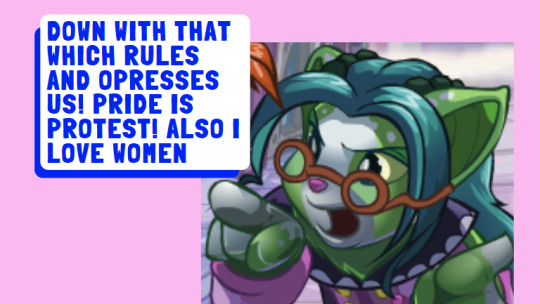
So, Xandra is pretty awesome, I hope she gets therapy then attends a Pride protest. She would totally be there reminding everybody that Pride started with riots. Also she loves women.
Thank you all.
(Read my other off the shits analysis essays at actualbird.tumblr.com/tagged/nobody-asked-but! If you have a request or suggestion for an off the shits analysis essay I can write, send me an ask!)
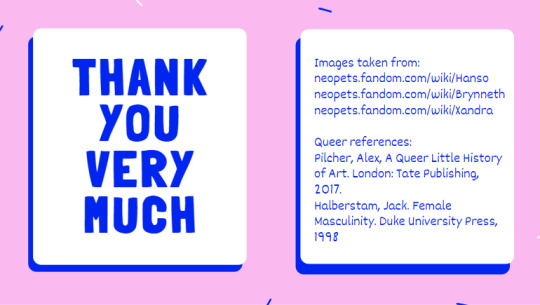
30 notes
·
View notes
Text
It Chapter Two: Aged-Up Protagonists and the Umbridge Effect

Writing reviews, metas, and the like is a lot about timing. If you don’t craft your writing in the immediate aftermath of your source’s release, someone else will beat you to it and, chances are, your audience will be less enthused about reading the same arguments weeks later. (Admittedly, that’s up for debate. I for one am happy to read about the same shit for years on end.) Thus, when I didn’t have the time or the mental energy to write about It: Chapter Two immediately after seeing it in theaters, I knew within a few days that I’d lost a lot of ground. Fans and critics alike have already spoken about the film’s major draws, namely the update on Richie’s sexuality and the canonizing of a beloved, thirty-year-old ship. We’ve also covered the issues that arose out of those positives. In 2019, is it necessary to show a hate crime in such violent detail? By giving us queer characters, have Muschietti and King unintentionally fallen into the trap of treating them badly? One is dead and the other mourns while the straight couple passionately kiss beneath the lake. Faithful adaptation vs. modern activism is a tricky balance to strike. I could rehash all those arguments here, but why bother? They’ve been articulated better by others already. Besides, falling behind means that I now have the space to discuss something just as important to me.
The Losers’ ages.
Now, I’m not sure if you all have noticed, but fantasy adventures aren’t really geared towards adults. That is to say, stories often contain adult content, but that’s not the same thing as putting adults at the center of the narrative. I’ve experienced a niggling sense of displeasure that’s grown stronger with each passing year and it took until my mid-twenties to figure out what it was: I am no longer the hero of many of my favorite stories. Because I’ve grown up. Harry Potter is concerned primarily with the trials and tribulations of characters between the ages of eleven and eighteen. If we return to that world---such as through a certain cursed play---the focus must shift to the new, shiny generation. Anyone who falls through a wardrobe is bound to be a child and if they dare grow up? They’re no longer allowed access to such a fantastic place. Kids are the ones who find the Hundred Acre Woods, or fall down rabbit holes, get daemons, battle Other Mothers when the world gets flipped, or head off onto all sorts of elementary and high school adventures. Sometimes, even those who are adults mistakenly get caught up in this trend. Frodo might be in his fifties, but as a small, kindly hobbit he comes across as younger than the rest of the Fellowship. Since the release of Jackson’s trilogy I’ve corrected more than one new fan who assumed (somewhat logically) that he is in his early twenties, max. It’s an easy mistake to make when we’ve grown accustomed to children and young adults taking center stage in so many fantastic, high-profile adventures.
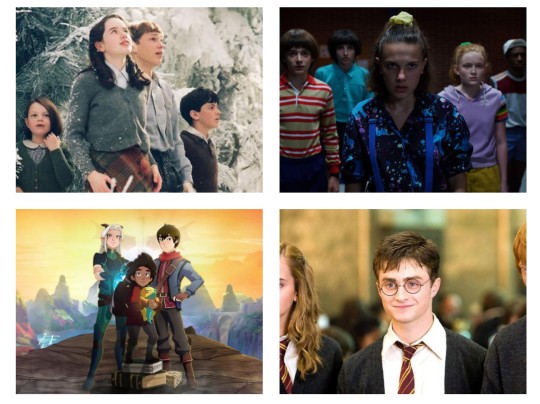
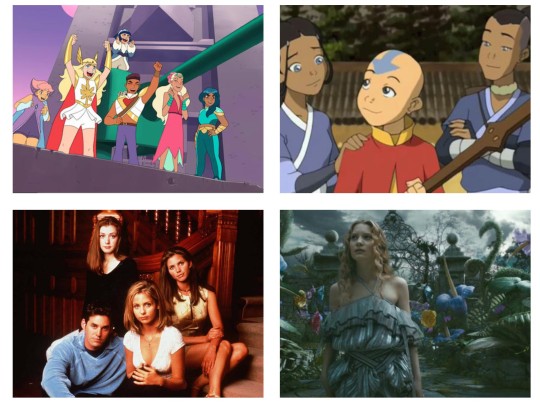
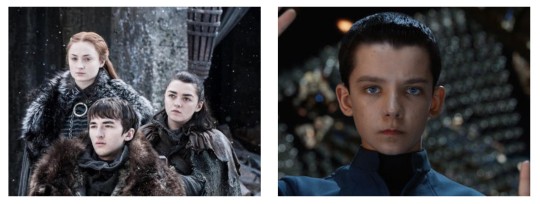
Of course, there are plenty of counters to this feeling. Just look at Game of Thrones. Though we see much of the story through younger perspectives---such as the Stark siblings---the vast majority of the cast is made up of adults, playing just as pivotal a role as the up-and-comers. Fantasy, Science Fiction, and other speculative story-lines are by no means solely in the hands of minors, yet I think it’s also worth acknowledging that a good majority of those stories do shape our media landscape. Or, if they’re not strictly minors, they’re characters who embody a sort of static young adulthood, the Winchesters and the Shadowhunters and all the television superheroes who might gesture towards markers of adulthood---we have long term relationships, hold down jobs, can impersonate FBI agents without anyone batting an eye---yet are still able to maintain a nebulous form of youth. They all (try to) look and act as if they’re right out of college. The standards of film and television demand that actors appear twenty-years-old even when they’re pushing forty, and the standards of much literature insists that twenty is simply too old for an adventure, period. I can still clearly recall two moments of shock (later agreed upon by my friends) when I encountered unexpectedly older protagonists in genre fiction: the realization that Sophie actually spends the majority of Howl’s Moving Castle as a very old woman and that The Magicians takes place in graduate school. “Wow,” I remember thinking. “When’s the last time that happened?”

What does all this have to do with It: Chapter Two? I don’t have any big twist for you here. It was just really refreshing to see such a fantastical story where our cast is all forty or older. Seriously, can we take a moment to appreciate exactly how much King undermined expectations there? The first half of the novel is structured precisely how we assume it ‘should’ be. There’s a mysterious threat, there are children caught up in the middle of it, and ultimately only they are capable of saving the day. We know this story. We even have the characterization of the town itself to reinforce this structure, a place so warped by evil that only the very young with their open-mindedness and imagination are capable of seeing Derry for what it truly is, illustrated beautifully in the film by Mr. Marsh straight up not noticing a whole room full of blood.
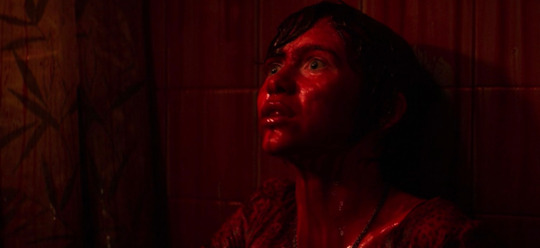
Though they’re It’s prey, children are also the only ones who have any potential power over him. You have to be able to acknowledge a problem in order to fix it and King could have easily ended his story at the first chapter alone, with the group somehow managing to defeat Pennywise for good the first time they set foot in the sewers. A part of me is still shocked he didn’t, if only because the young savior as an archetype was embedded within Western culture far earlier than It’s 1986 publication. From Carrie to The Girl Who Loved Tom Gordon, Pet Sematary to Firestarter, King is no stranger to putting children at the center of fantastic tales. Yet he’s also given us numerous adult protagonists, managing to find an enjoyable balance between the two, both within individual novels and his entire corpus. It represents that balance, not just imagining a story where seven (yes, I’m counting Stan) middle-age adults manage to finally save their town, but actually setting up a twenty-seven year jump to allow for that. It's the best of both worlds, exploring the difficulties inherent in both childhood and adulthood, arguing that we need each---that imagination and that experience---if we hope to come out alive.
While watching It: Chapter Two I took note of how many people laughed throughout the film, and not just at the moments set up to be funny (looking at you, Richie). Rather, the film that two years ago had scared the pants off of movie-goers now entertained them in a much more relaxed manner. No one was hiding behind their popcorn; there were no shrieks of fright. I’ve seen more than one reviewer express displeasure at this change. What the hell happened? Isn’t an It film supposed to be scary? Well, yes and no. I think what a lot of people miss is how providing us with an adult cast inherently changes the way fear manifests, both literally in the case of Pennywise’s illusions and thematically in regards to the film itself. This sloppy bitch, as established, preys on children. His tricks have the illogical, fantastical veneer that reflect how children see the world: you’re scared of women with horrifically elongated faces, zombie-like lepers, and hungry mummies. They’re literal monsters emerging out from under the bed. Of course, as adults watching the story we’re easily able to see how these monsters represent much deeper, intangible fears: growing up and disappointing your father, falling ill like your mother always claims you will (to say nothing of contracting AIDS in connection with a budding queer identity), and the danger that comes with being alone and ostracized. Sometimes It: Chapter One gestures more firmly towards those underlying fears---such as the burnt hands reaching for Mike when we know his family died in a fire---but only once does it make the real horror overt, when Pennywise takes Mr. Marsh’s face and asks Bev if she's still his little girl.
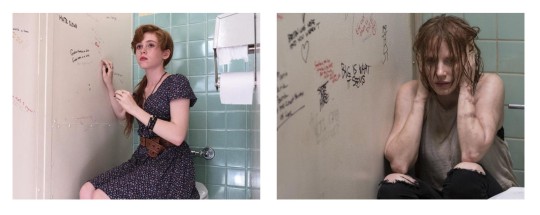
Outside of pedophilia and sexual abuse, Chapter One’s real horror is mostly coded, symbolic, left up to (admittedly rather obvious at times) interpretation. It’s just under the surface and we’re meant to be distracted by the fact that, allegorical or not, there’s still a very creepy thing hunting our protagonists from the shadows. For two hours we take on a child’s perspective, biting our nails at all the things we once imagined hid inside our closets. We’re scared because they’re scared.
That mindset irrevocably changes once your group grows up. Forty-year-olds simply don’t freak out in the same way a bunch of thirteen-year-olds would, especially now that they know precisely what’s happening and have the mental fortitude to combat it. At least to an extent. Chapter Two isn’t as traditionally scary for the simple reason that the film now acknowledges what all adults eventually must: there’s nothing in the closet, there’s nothing hiding under your bed. Or if there is, it’s something tangible that can be handled with a calm(ish) demeanor and a well-placed ax. An adult might scream when something jumps out at them, but they’re not as inclined to cower. Adults might still be scared, but they’re better able to push that fear aside in order to take action. The group first reached that point in the sewers--- “Welcome to the Losers’ club, asshole!”---and now fully embodies that mindset with nearly three decades of growth and experience to draw on. This is why Ben investigating the library as a teen reads as teeth-chatteringly scary, but Ben and Bill as adults investigating the skateboard produces only a comment about how they're getting used to this nonsense. They know, and we as the audience know, what the real threat is and whether or not we need to shield our eyes when something starts clunking its way down the stairs.
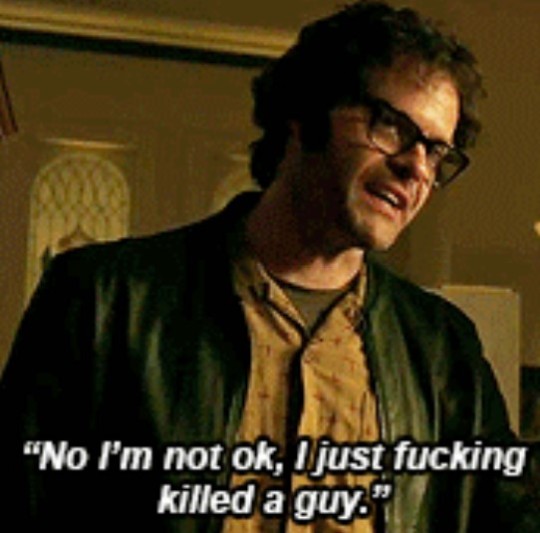
All of which isn’t to say that Chapter Two isn’t scary. It’s simply scary in a much more realistic manner, killer clowns and Native American rituals aside. The fears have been aged-up along with the cast, stripping away the child-like fantasies that made us wet our pants in Chapter One. What’s the scariest moment outside of the jump scares? When two men and a kid beat a gay man and then chuck him in the river to drown. You’ll note that, unlike in the first film, Pennywise doesn’t actually have to do much work here. Seasoning people up with fear? The rest of the world is doing that for him. That first scene detailing a truly horrific hate crime (which, by the way, is based off of true events) results in a meal delivered straight to Pennywise’s arms. It’s people who targeted that couple, beat one of them within an inch of his life, and then tossed him over a bridge, bleeding and shrieking for help. All Pennywise had to do was scoop him from the water and take that first bite. He’s incidental to the film’s most cringe-worthy scene. We can argue all we want about how it’s Pennywise’s influence that “makes” the town this way, but any queer viewer knows that's simply not the case. In 2019 we're still living this horror, no Pennywise required.
Likewise, the two children we see murdered are much more overtly grappling with fears that have nothing to do with fantastical monsters. Dean, the little boy Bill tries to save in lieu of Georgie, is rightly petrified because a seemingly crazy adult is now stalking him. We as the audience know that Bill is just trying to help----that he’s not the real danger here----but that’s not the perspective this kid has, nor is it the issue the film is grappling with. We first see him approaching an idol of his, Richie, and instead of an enjoyable experience he winds up getting yelled at. The It films are only tangentially interested in the status of fans and their relationship with celebrities, but we know it’s a common theme for King’s work overall. Look at Misery and look at this cameo: a disenchanted fan of the 21st century, criticizing a writer’s novel and leveraging him for money. “You can afford it,” he tells Bill, swindling him simply because he can. The context of this little boy as a fan and Richie as the older, bigger, larger-than-life comedian adds another layer to the interaction. It’s not just an adult verbally attacking a child, it’s an adult this kid worshiped enough to recognize and quote his material from memory. Who easily walks away from that?
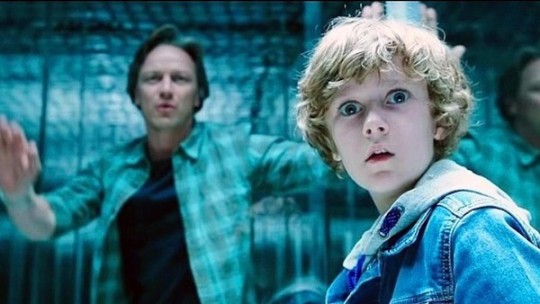
This little boy then finds Bill shrieking at a sewer opening, is manhandled by him, and told in the scariest way possible, born of Bill’s own fear, that he has to get out of dodge, fast. There are scary things out there, Dean freely admits that he’s heard kids’ voices coming from the tub drain, but right now the scariest thing is how badly the adults in his life are failing him: parents (from what little we can gather) are distant, his comedic idol is mean, and now this stranger is traumatizing him in the middle of the street. Once again, it’s easy to see how Pennywise isn’t needed to sow fear or even enact cruelty; he’s not a requirement for horrible things in the world, he’s merely their reflection. We see the same setup with the little girl under the bleachers. That scene demonstrates precisely how not scary Pennywise is. Here’s this child putting aside her discomfort over his looks and agreeing to be his friend. What’s worse than a clown with a creepy expression? The knowledge that all the other kids have already rejected you because of a birthmark on your face. Bullying is the far greater threat and one we’re 100% more likely to deal with in our lives than a killer clown, so the second film re-frames Pennywise to better acknowledge this. He’s scary because things like bullying and neglect exist to give him an easy in. He’s even scary because in this moment, hiding under the bleachers, manipulating this little girl, he’s fully embodying a child predator. Chapter One was a primal, “There’s a monster hiding in the shadows” kind of fear. Chapter Two is a, “We’re all going to die from climate change” kind of fear. Logical and largely inescapable. Characters like Richie don't need Pennywise to take some fantastic form to scare him. Homophobia has already done all the work.
Ultimately, I think of this as the Umbridge Effect. Who’s the most hated character in the Harry Potter franchise? I’ll give you a hint, it’s not the Dark Lord responsible for two wars, attempted genocide, and the death of our title character.

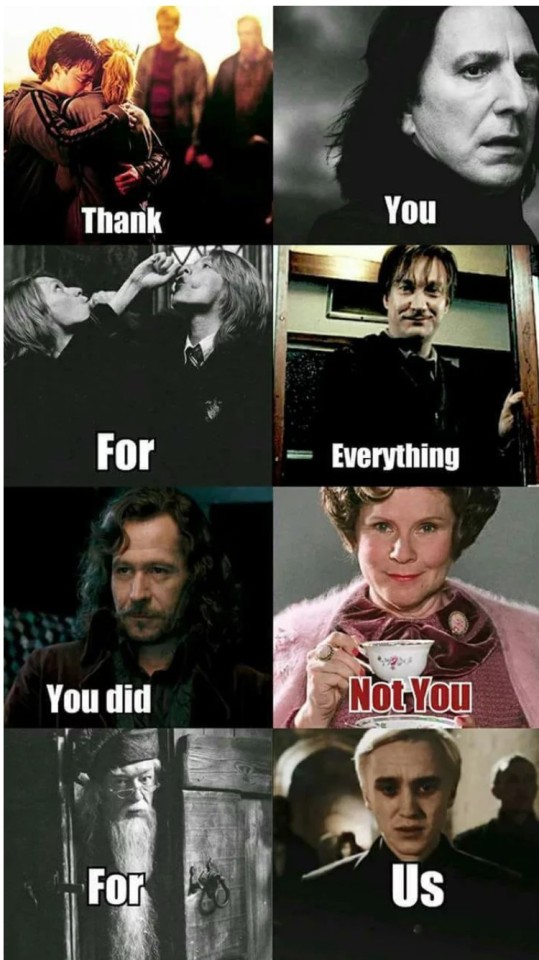

We despise Umbridge because she’s real. She’s relatable. She’s grounded in a way that Voldemort could never hope to be. We have no fear that an all-powerful sorcerer is suddenly going to come out of the woodwork and attempt to enslave and/or eradicate everyone without magic. That’s just not on our list of things to worry about. A corrupt politician, however? An instructor who uses her power to emotionally and physically torture students, getting away with it because of a cutesy, hyper-feminine persona? We’ve seen stuff like that. We’ve lived it. Umbridge represents all the real wrongs in the world when it comes to bigotry and privilege. Therefore we hate her---we fear her---in a way we could never hate or fear Voldemort. Now, in It: Chapter Two, Pennywise is the new Voldemort. Is an alien clown with an unhinged jaw and three rows of teeth technically scary? Sure, but it doesn’t hold a candle to the real problems that plague the cast: abuse, anxiety, depression, suicidal ideation, the fear that someone will hurt or outright kill you over some part of your identity. These are things we continue to fear long after the credits roll and the lights come up, and they’re now barely coded in the story:
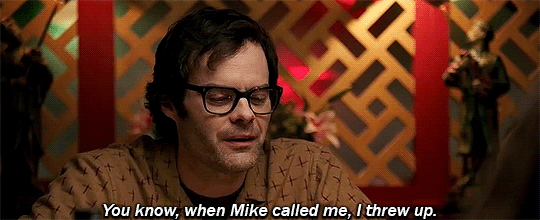
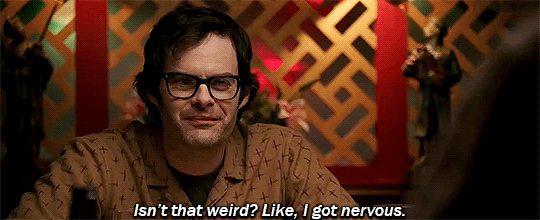
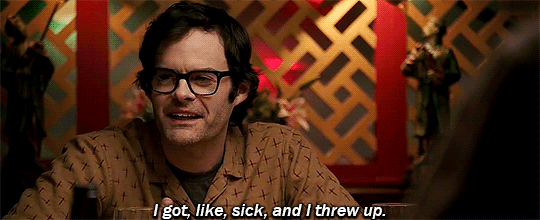
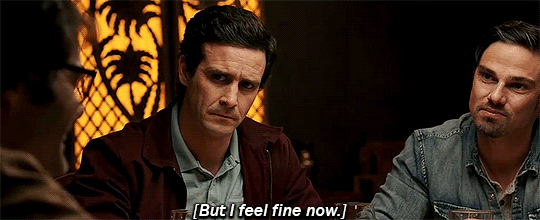
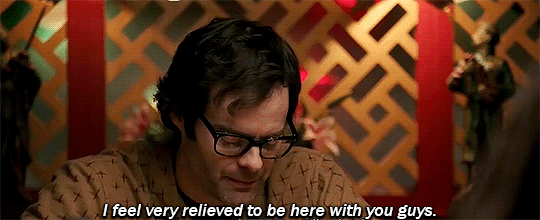
It occurred to me halfway through my viewing that the people laughing at the characters’ new plights were the same ones who didn’t flinch when a gay man’s head cracked into the pavement. I had both hands over my mouth during that scene and I wasn’t snickering whenever Eddie had a panic attack, or Ben’s self-confidence took a hit. Because those moments, like our opening, hit pretty close to home for me; I didn’t find them embarrassingly humorous in the way much of my theater did. So many reviews in the last two months have insisted that Chapter Two isn't scary, but I think that depends entirely on whether or not you're struggling with these now explicit threats. We're not dealing with mummies and creepy portraits anymore. Instead, tell me how you feel about holding your partner's hand in public. Do certain memories make you vomit? Or freeze? Consider heading upstairs to the bath? The horror is dependent on how the audience views Bill's stutter coming back, or the bruises on Bev's arms.
The cast grew up. It’s a fantastic twist. It also means that the horror needed to grow up with them, resulting in a film that could no longer function as a simple, scary clown movie. Our ending reminds us of that. When did people laugh the loudest? When the Losers’ club was bullying Pennywise into something vulnerable. And yeah, I get it. It’s a cheesy moment that we feel the need to laugh at because it’s just so unexpected. Awkward, even. Since when are badass horror monsters defeated with a bit of backyard peer pressure straight out of middle school? If this were any other story, Pennywise would have been defeated by Eddie’s poker. The most scared member of the group finally finds his courage! He has faith that this simple object can kill monsters! He throws it in a perfect arc, splitting the deadlights in two! That’s a heroic ending. Something epic and fantastical, relying on the idea that the Good Guys will win simply because they believe in themselves... but that’s not how the real world works. That ending is a child’s fantasy. Sometimes you do the heroic thing and end up dying anyway. Which isn’t to say that the heroic thing is useless. It saves Richie’s life. It’s just that a single act can’t cure all our ills in the way that storybooks often claim they can.
How then does an adult deal with huge, intangible problems like bigotry and mental illness---the things Pennywise now fully represents? By saying “Fuck you” to those things again and again with all the support you can possibly wrangle up at your side. You refuse to let those issues control you; you drag those child-like representations into the light and remind yourself just how small they really are. We don’t get to beat something like depression by spearing it with a fire poker in some overblown finale. If we did, we’d all be having a much better time. All you can do is band together with friends and scream that you’re not going to let your fears define you anymore. Pennywise is a symptom of all the true horrors in the world. Sadly, you can’t beat those with a baseball bat. But you can acknowledge the heart of the issue, literally in the case of five friends squeezing until that one symptom, at least, is gone.
Image Credit
#1:https://www.screengeek.net/2018/07/10/it-chapter-2-character-mashups/
#2:https://earlybirdbooks.com/the-re-read-the-lion-the-witch-and-the-wardrobe
#3:https://www.vox.com/culture/2019/7/4/19413771/stranger-things-season-3-review-recap-hopper-elevenrussians
#4:https://comicbook.com/movies/2019/08/08/harry-potter-movies-review-10-years-late-snape-dumbledore-franchise/
#5:https://www.denofgeek.com/us/tv/netflix/277257/give-the-dragon-prince-a-chance
#6:https://www.forbes.com/sites/lindamaleh/2019/04/23/she-ra-and-the-princesses-of-power-season-2-review/#ec7022c42953
#7:https://www.commonsensemedia.org/tv-reviews/avatar-the-last-airbender
#8:https://www.newsweek.com/buffy-vampire-slayer-turns-20-charisma-carpenter-shows-enduring-legacy-and-566123
#9:http://theinspirationroom.com/daily/2009/alice-in-wonderland-the-movie/
#10:https://www.hindustantimes.com/tv/game-of-thrones-this-edited-out-scene-between-bran-and-sansa-reveals-so-much-about-finale/story-qFDHflH2dO6Kcki1wgsEyM.html
#11:https://www.cinemablend.com/new/Why-Ender-Game-Best-Possible-Adaptation-Book-40110.html
#12:https://www.hollywoodreporter.com/live-feed/supernatural-end-season-15-cw-1196579
#13:https://www.slashfilm.com/it-chapter-two-scene/
#14:https://www.vox.com/culture/2017/9/12/16286316/it-cleaning-up-blood-scene-feminism
#15:http://www.allocine.fr/film/fichefilm-208633/photos/detail/?cmediafile=21647122
#16:https://stanleyyuris.tumblr.com/post/188300897715/chaotic-losers
#17:https://whatculture.com/film/it-chapter-2-every-character-ranked-worst-to-best?page=3
#18:https://www.reddit.com/r/harrypotter/comments/7uhrkz/the_most_hated_character/
#19:https://9gag.com/gag/am2X2Z4?ref=pn.mw
#20:https://screenrant.com/harry-potter-hated-characters-unpopular-worst-ranked/quickview/17
GIFs1-5:https://the-pretty-poisons.tumblr.com/post/188344826978/why-is-everyone-looking-at-me-\like-this
71 notes
·
View notes
Note
1/2 I saw a comment that said “bi woman are either practically gay or practically straight” and it’s bothered me a bit. Obviously many(maybe most) bi people have preferences and it’s not always 50/50 and that comment is really ignorant. But I’m a bi girl that I guess would be considered “mostly straight” cause I have a preference for men and am sometimes confused about how I feel about girls and it makes me very anxious about whether I’m using the right label or not.
2/2 I always see that bi women tend to prefer women over men and I feel very different from that. I’m not really attracted to woman that “everyone” would love to date and I’m constantly questioning whether labeling myself as bi was right. At least when I was questioning/bicurious there was less pressure but a the same time I wasn’t getting any answers. I feel like there’s something there and there has been for some years which is why I label myself bi but I don’t feel queer enough.
Okay, there’s a lot to unpack here so I think I’ll resort to the good old method of going through your message bit by bit.
1) “bi woman are either practically gay or practically straight”No they aren’t. Bi women are always bisexual, regardless of their preferences. Yes, some bi people have a strong preference for one gender but that doesn’t make them “basically gay/straight”. As long as you are attracted to multiple genders to some degree then you can call yourself bisexual! A lot of bi people don’t have a preference at all or their preference changes over time. But even if your preference is always for men that doesn’t make you any less bi! Saying that someone isn’t really bi if they have a preference and that they should just label themselves “gay” or “straight” is an act of biphobia!
2) “[I’m] very anxious about whether I’m using the right label or not. [...] At least when I was questioning/bicurious there was less pressure but a the same time I wasn’t getting any answers.”There you have it. If being “questioning/bicurious” didn’t give you answers but being “bisexual” does then that’s a pretty big hint that “bisexual” is the better label for you. And nobody else gets to decide whether a label is right for you or not. That’s only your prerogative. You want to identify as bisexual? Then congrats, you’re bisexual. Even if you like a thousand men and only one woman or nb-person - that’s enough! The only thing that matters is that you want to use the label. And the fact that you’re scared of not actually being bi is a really big sign that you are bi. Because anyone who is actually straight is usually pretty cool with that and just moves on without worrying about it.
3)“I always see that bi women tend to prefer women over men and I feel very different from that.”I’m pretty sure that perception is skewed by the tumblr version of what a ~good bisexual woman~ should be like. A lot of supposedly “bi-inclusive” sapphic content on here doesn’t leave room for women who are attracted to men. The biphobia both on tumblr and in the offline world causes some bi women to downplay their attraction to men and to feel guilty about it. Biphobic lesbians expect us to be “sorry” for our attraction to men and unfortunately some bi women fell for that and are stuck in a cycle of internalised biphobia in which they treat their own attraction towards men like it’s a huge betrayal of the sapphic community. Yes, some bi women really do prefer women. But probably just as many bi women prefer men. You just hardly ever notice them because they are either closeted or they get perceived as “straight” and tthus heir queerness gets completely erased. (Bi women in f/f relationships also get mislabeled as “lesbians” often but at least that doesn’t take their queerness away.) Actually, the majority of bi women date or get married to men for three main reasons. One: the dating pool is much bigger (= more options). Two: biphobia within the LGBTQIA+ community means they don’t feel comfortable here. Three: they live in a conservative environment in which dating a woman just isn’t a viable option. But none of that makes these bi women any less bi or “practically straight”. They are still attracted to more than one gender = bisexual!
4) “I feel like there’s something there and there has been for some years which is why I label myself bi but I don’t feel queer enough.”That’s text book internalised biphobia, sweetie. You’ve soaked up all those biphobic statements and misconceptions that are out there, both in mainstream society as well as within the LGBTQIA+ community and you internalised them. They cause you to overanalyse and question every little bit of your sexuality. They cause you to doubt yourself and make you feel “not queer enough”. That’s one of the most common struggles that bisexual people have to deal with. Here’s some detailled advice on internalised biphobia that I strongly suggest you check out!
Maddie
8 notes
·
View notes
Text
yeahsureyoudo replied to your post “What are your opinions on gay women choosing to identify as Queer...”
I actually identify as Queer, not because I'd have any shame about identifying as a lesbian but because i just feel more comfortable with Queer.
I also think the term queer is useful for trans lesbians that perhaps aren't out yet? Women that love women but are not fully identifying as female to the whole world yet. If that makes sense?
I find it both sad and amusing that you have unwillingly proven the point of one of the many issues with the word ‘queer’.
First off, lesbians don’t ‘identify as’ lesbians, we are lesbians. To imply identification, which is something immaterial and subject to constant change, tied to the whole gender-mania of ‘~~~sometimes I’m more of a boy, sometimes I’m more of a girl and sometimes I’m both!!!1!~~’ means you’ve successfully tied lesbianism to a choice, to ‘fluidity’ (to play along with the jargon) and all that hogwash that has nothing to do with what an actual female who is exclusively attracted to other actual females is. The word Lesbian is not a title, it is not a label to be given or ‘claimed’ because it has a very clear definition: as just mentioned, lesbians are females exclusively attracted to other females. No ifs, no buts, no choices, no silly little games of ‘identity’. It is for no one to use for themselves but actual lesbians; it’s not for straight women, it’s not for bisexual women and it sure as hell isn’t for any sort of man to put his greasy hands on.
If by any chance, ‘lesbian’ feels ‘restrictive’ or if it really, really doesn’t reflect your experiences (as in, if you’re not really a homosexual female), maybe you’re just bisexual -- and there’s nothing wrong with that. But, see, the problem lies not with lesbianism; the problem is with the hypothetical person in question, who just isn’t a lesbian.
To posit lesbianism as an identity is to allow anyone to take it and, among other things, this is what the ‘queer movement’ does, stripping actual lesbians from ourselves (calling us gynosexuals or something equally ridiculous, as if we needed another word, as if ‘lesbian’ didn’t express it) and handing us on a silver plate to anyone who isn’t us -- but wants to exploit us.
Secondly, ‘queer’ is something that alienates us from ourselves and pushes us towards the values of those who antagonise us. I’ll break it down for you: if a lesbian falls into ‘queer community’ and starts to absorb their values upfront instead of those which would actually benefit her as a lesbian, it becomes easy to manipulate her to act against her own interests and those of lesbians she might come in contact with. Instead of finding her own crowd, with experiences and needs that are much more akin to her own, she mingles with people who oppose these experiences and deny these needs directly -- she begins to interact with and defend, as you have just done, the interests of males masquerading as women trying to get into lesbians’ beds, for instance, without understanding just how fucking perverse that is. We find adversaries in what presents itself as a community of equals, of people who understand and sympathize with our struggles, because in fact ‘queers’ do not understand the first thing about our struggles.
‘Queer’ is a divide-and-conquer tactic. The more lesbians side with it, the more they compromise their safety and their own subjectivity, something already much beaten around by a lesbophobic society that tries at every turn to annihilate us, either by physical force or by total erasure, by conversion, by coercion, trying to get us to worship at the altar of the phallus which, by definition, we are incapable of doing because we’re gay women, for fuck’s sake. We can be mislead, as the ‘queer folks’ try to do, but we cannot truly be converted. However, this deception is highly destructive, individually and collectively.
‘Queer’ alienates us from our very selves and it alienates us from one another, it creates rifts between lesbians who could otherwise work together, live together, love together. It walks hand in hand with cries of ‘terf!!!’ because all the ‘non-queer’ lesbians end up being shunned -- we don’t want to associate with men impersonating women or lesbophobic bisexuals (or straight people who truly believe a woman using a strap-on with a man is somehow ‘queering sexuality’ and makes them in any way comparable to us homosexuals!), so we’re punished for it. Lesbians who walk away from it are deemed suspicious and bad, while the ones who accept the label and play along with delusions are the ‘good’ ones and it stunts communication between these two ‘factions’ that should never be factions in the first place. It sets us apart and it sets us against one another. Quite honestly, it’s extremely depressing to see misguided lesbians being pitted against others simply because, unlike them, we prioritise actual lesbians in our lives instead of people who think we should all just shut up and open our legs for just about anyone.
This damn term creates a divide. It’s hard for us sometimes to find authentically lesbian communities because the support for ‘inclusivity’ -- as opposed to our caring about ourselves for once in our lives, since nobody else in this godforsaken planet gives a single shit about us -- makes enemies out of women who should have the same goals. It contributes to the effacing (and worse, the self-effacing) of lesbians, it corrodes our networks, it isolates us from one another. Inclusivity in the name of what? To whose benefit? Because the effects of all of this are negative to lesbians. And I know people who aren’t lesbians couldn’t at all be bothered about us and wouldn’t care if all of us ‘transphobic, biphobic’, ‘queerphobic’ dykes up and disappeared, but that’s precisely why we must put ourselves first. It isn’t selfish, it’s self-preservation. We have a right to exist as we are, not bent and broken as people want us.
Some lesbians fall into the trap of thinking that ‘lesbian’ is just a porn category, that it’s too loaded a word, and they shy away from it. But we came before porn, are we really just going to strip ourselves of our words, silence ourselves, and hand them over to sick men just like that, in the blink of an eye? They should be ashamed of co-opting a beautiful word that holds meaning to us to tag their trash with, not us. And as for it being a ‘loaded’ word, yeah, it has history, it has weight, it has pride. It is us, us who refuse to die out, who refuse to erase ourselves to be with men just because ‘oh, poor menz, give them a chance’; it is the name of our almost unwilling resistance because honestly it should not be so hard to live in this stupid world, having to justify ourselves at every turn, having to defend ourselves from attacks on all fronts just because we were born women who commit no other crime than loving only other women.
You have given the key to understanding the problem in your own reply. That a straight male who doesn’t even go to the trouble of dressing himself up in order to disguise himself as his revolting idea of what a woman actually is should use ‘queer’ so as to access spaces to which he otherwise could not shows what the word can do. It blurs lines. It removes barriers that exist for a reason. To be ‘queer’ is to be nebulous because nowadays it means just about anything; and lesbians are not someone’s vague idea, we are women of flesh and blood who have very specific experiences that are tied to our sexuality because this lesbian-hating society despises us to the point that we are being pressured to abandon the words that define us so we don’t sound ‘outdated’, so that we are more ‘inclusive’ and politically correct, preparing the terrain ourselves so that men can try to get into our pants. Do you see? We are being deprived of even calling ourselves what we are, we are being deprived of ourselves, in a way. And, I repeat, to whose benefit? Think. And if you refuse to think, then feel -- since so many are ready to feel on behalf of transgender males, why is it that you have never and will never feel anything but contempt for lesbians? Why do they deserve your time and compassion and why do we deserve your scorn?
Lastly, because this has gone on too long, let me reiterate a very simple fact about this blog: it is for lesbians. We have stated time and again that we are open and welcoming to bisexual women in relationships with women, but ultimately our focus lies with lesbians and we shall not tolerate male-pandering, lesbophobic bullshit here. If you’re not a lesbian, if you’re not here for lesbians, if you sincerely believe that we should embrace males as ‘lesbians’ because of ‘queer fraternity’ or some equally obnoxious, ridiculous garbage argument, kindly fuck off forever from this blog and please never interact with a lesbian again.
(An addendum: Why on Earth have you capitalized ‘queer’ but not ‘lesbian’? Seriously??? Why is that? Must I dwell on that too, must I interpret it here or is that proof enough of just how little respect there is for lesbians that the word in itself is seen as lesser-than as opposed to how people use what many still consider a slur? Fuck’s sake.)
/Mod T
58 notes
·
View notes
Link
Story time! It’s long, so my reflections are under the cut.
TLDR: I’m hopeful but cautious. This may be what keeps the UMC a viable denomination, if it can pass General Conference 2020, because right now we’re a church of divided theology, and neither side is going to compromise their beliefs.
Long before I left my former church, back in 2015, I was at church preparing for the following week’s VBS when I got a news alert on my phone about the Supreme Court’s Obergefell v. Hodges. At the time, I kept my elation mostly to myself - I didn’t know how the pastor at the time would feel about it, and I didn’t want anything to dampen my mood. Just over two months prior, I had defended my undergraduate thesis, which argued that bans on same-sex marriage were unconstitutional, and proposed one thread of reasoning that I thought the Court might reasonably adopt, and while my research advisor and my thesis advisor had both thought I was dead wrong, I was pleased to be proven right (and, of course, pleased that the Court was taking steps to fix what seemed to me to be an ongoing injustice in the United States).
See, I had left the Catholic church, in part, over the same-sex marriage issue. While I’m not LGBTQ+ myself, I felt that the issue was one of fundamental fairness and compassion - and it was important to me that it be resolved. The Methodist church also didn’t support LGBTQ+ rights, but it had always seemed less vehement about it than the Catholic church, so I always kind of just hoped that the change was coming.
In 2016, with the same-sex marriage issue broiling in advance of General Conference, I took an interest in how the UMC underwent changes for the first time. My pastor’s encouragement of that interest started me on the path toward serving at Annual Conference in my area, but I read news from General Conference 2016 praying for a resolution. The debate, and the protests, left an impression on me, and I had real hope heading into my Annual Conference that year that the compromise - the Way Forward Commission - could actually work.
At Annual Conference, I heard the story of bishops meeting late at night, summoning people from both sides of the debate, to try and find a way to avoid a schism. And at the time, “schism” was a scary word - could the UMC survive a split? I also encountered the Reconciling Ministries Network for the first time. They gave me a rainbow stole; I wore it happily. I also saw my pastor wear one, and for the first time I really believed, not just hoped, that change was on the horizon.
Things stagnated, then, though I had the pleasure of getting to really know a woman who brought their adopted daughter to Children’s Church every Sunday, and occasionally her former foster daughter as well. She was in a lesbian relationship, and especially after I started law school she opened up to me frequently about how frustrating it was for her and her partner to constantly be viewed with more suspicion than an average straight couple. It was one of the reasons, she implied, that her partner didn’t regularly attend church.
In came a new pastor. He was friends with our former pastor, so I had high hopes for him. As my previous posts will display, the hopes were misplaced on a personal level, but we actually had somewhat compatible politics. The Way Forward Commission came out with their three plans.
The Traditional Plan would retain anti-LGBTQ+ language in the Book of Discipline, and strengthen disciplinary measures against gay and lesbian clergy members.
The Connectional Conference Plan would form three sub-churches: one for traditionalists, one for progressives, and one for “unity”-minded churches and clergy.
The One Church Plan would remove the anti-LGBTQ+ language and permit local churches and clergy to express their conscience on the matter.
And in February of 2019, a special session of the General Conference voted on the Traditional and One Church Plans. I had school obligations those days; I ignored a good chunk of my classes to follow the news. I knew - I just knew - that the One Church Plan would succeed. I had already formulated my arguments to my local church as to why we should embrace our LGBTQ+ brothers and sisters. It was the perfect compromise; I never expected it to fail.
But General Conference 2019 voted it down. At the time, this is what I wrote, and I stand by it today when I think back on it:
“I cannot fathom a church that would choose divisiveness and alienation over compromise and compassion. We waited three years in the hope of progress. The delegates gave us nothing but regression.
The United Methodist Church is dying, at least in the United States. Fewer and fewer people are joining. More are leaving. I don’t understand the reasoning behind choosing to alienate and reject people who are begging for inclusion and acceptance.”
The next day, Reconciling Ministries tweeted that they had been informed by the General Conference staff that the area now had “police with their guns and security with pepper spray (or similar) roaming and ready for action.” What it sounded like - and sometimes appearances are everything - was a violent precautionary measure, aimed at intimidating those who had supported the One Church Plan, and who vehemently opposed the Traditional plan, so that those who wanted inclusion and compassion would sit down, shut up, and take what was coming quietly. I felt sick at the time, and still feel sick thinking about it now.
I was in class during the vote on the Traditional Plan, ignoring my professor as I watched Twitter and Facebook for the news. And by the time I got home, I had recognized why passing the Traditional Plan bothered me so much: John 8:3-11.
For those who aren’t Bible buffs, John 8:3-11 recounts the story of the Pharisees bringing Jesus a woman caught in the act of adultery, then punishable by stoning. When the Pharisees demand that Jesus tell them what to do, he famously responds: “Let anyone among you who is without sin be the first to throw a stone at her.” Of course, no one could live up to Jesus’s standard. Those hoping to stone the woman disperse and, when the woman observes that her accusers have left, Jesus sends her on her way: “Neither do I condemn you.”
Back in February, I summed it up like this, and I can’t really think of a better way to phrase it now:
“To declare that clergy members who do their earnest best to live the life God calls them to live should be punished because we disagree with their moral determinations is arrogant. We allow liars to be clergy. We allow those who speak unkindly to be clergy. We allow it, even if these sins happen more than once.
Why is the sin of loving the wrong person worse than lying? Worse than being unkind? And even if you believe that the sin is worse, who are we as humans to overrule what Jesus said about justice and mercy?
In my heart of hearts, I can find no rationale for pushing to increase enforcement of the anti-LGBT language in the Book of Discipline other than hatred for that which the Traditional Plan’s supporters do not understand. Jesus calls for compassion; and, as a church, we have no right to ignore that call.”
As time wore on, I observed one more thing: if God calls a lesbian woman, or a gay man, or anyone else, to the clergy, who are we as humans to deny that calling? Who are we to tell God that he called the wrong person? How arrogant and presumptuous must we be under the Traditional Plan?
In February, things were drawing toward the end at my church. But in the days following General Conference 2019, I found myself heartened by the message on the marquee sign outside: “ALL MEANS ALL.” My pastor signed an open letter to the church condemning the Traditional Plan, and one of the women in the church whom I’d thought was genuinely a good friend told me that she, too, was broken over the decision, but had resolved to fight for something better.
My co-teacher and I made the decision on Sunday to talk to the kids about the decision of the General Conference. It was difficult - remember, one of our students had lesbian parents - but, we felt, it was necessary. And I have never been more inspired than when our little kids expressed their confusion and outrage over a decision that, to them, made no sense. One little girl expressed confusion at how something as basic as the freedom to love someone and get married to them could be controversial.
The little acts of resistance, the outrage from the kids, it all came together to reignite my own hope.
In the months that followed, just about everyone expressed their opinions. In the Washington Post, a queer clergywoman summed it up: “We queer clergy begged our fellow Methodists to love us. They voted no.” On Facebook groups, on Reddit, and in person, the heretofore forbidden s-words became more common: splitting. separation. schism.
A prominent minister on the traditionalist side, less than a month after “winning” at General Conference 2019, made clear that unity, compromise, and compassion were never an option. Mainstream UMC posted his e-mail in full - in summary, he gloated over the traditionalist win at General Conference 2019, and suggested that those who opposed it should leave, as their continued presence in the UMC is an embarrassment.
And talk of schism, and of separation, has continued to simmer, until now. Now, the water’s reached its boiling point. We have a plan. We have the Way Forward we were promised. And at General Conference 2020, at least the way I see it, the delegates have two options: stop the pot from boiling over, or ignore the problem and hope we can clean up the mess in 2024.
Membership in the Methodist Church in the United States has been dropping for years. Increasingly, young adults looking for churches veer away from churches that preach or even merely accept exclusion and intolerance. Splitting the church, accepting that we cannot compromise on issues of love and compassion, seems to me to be the only way to prove that we mean it when we say “Jesus is Love.” It seems to me that this is the only way to prove that we’re convinced of our own beliefs, that we’re serious about welcoming everyone, that we’re a church of love, and inclusion, and protection of human dignity.
So long as it passes.
#christian#methodist#united methodist#united methodist church#christianity#gay rights#diversity#news#christian news#umc news#methodist news#gc2020#umc split#methodist split#methodism#general conference 2020
0 notes